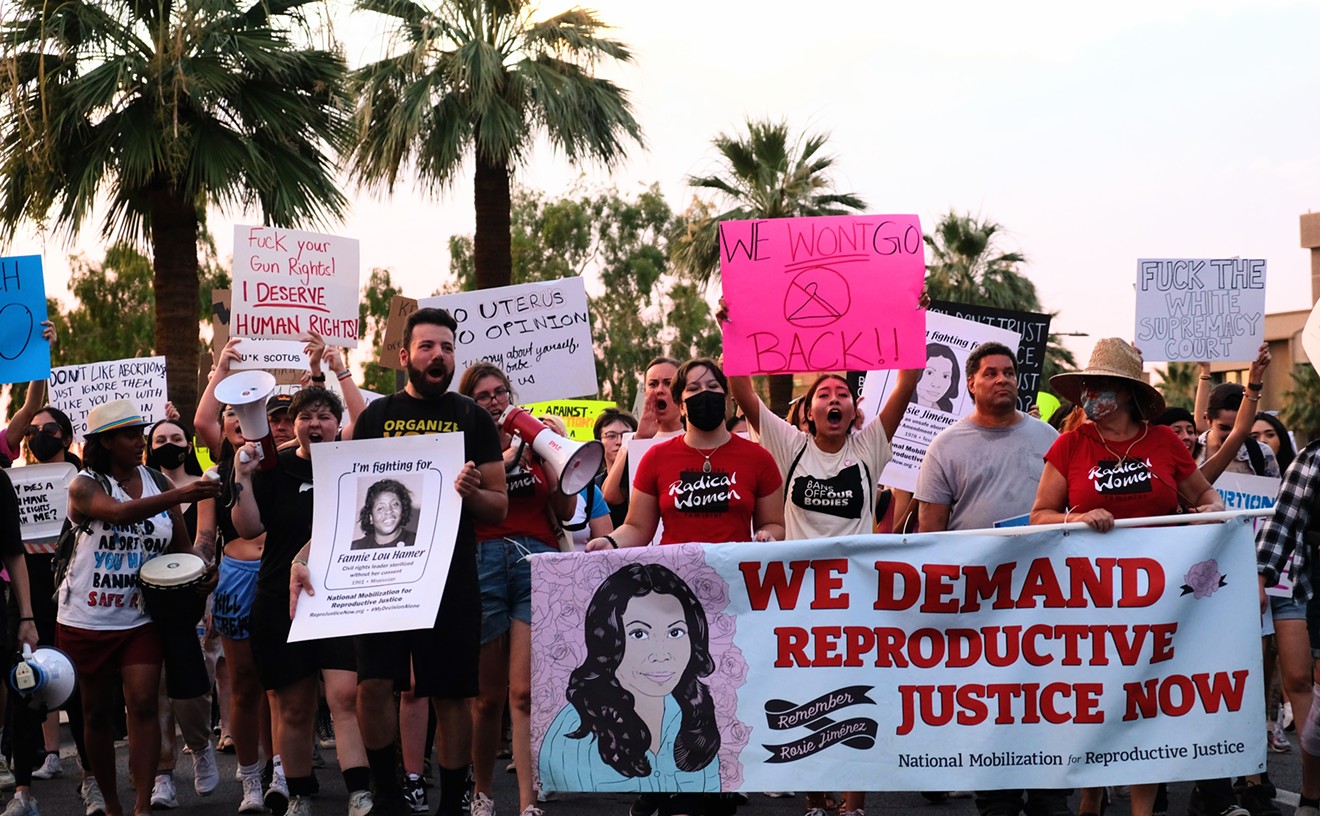Mike Terribile and Treasure Van Dreumel made lots of money defending recently convicted murderer Jeff Martinson on the taxpayer's dime.
The actual sum is almost $1 million per attorney over the past 28 months for work in the tragic and highly controversial case.
New Times wrote about State of Arizona vs. Martinson in last week's issue. Titled "Eating Jeff," the story revealed serious allegations of juror misconduct that may win Martinson a new trial, sooner than later.
The jury convicted the Ahwatukee man of first-degree felony murder and child abuse in the August 2004 apparent drug overdose death of his son Josh, who was 5.
But the panel couldn't decide whether to impose death or life.
Superior Court Judge Sally Duncan declared the jury hopelessly hung (two panelists voted for death). A retrial on the sentencing phase will be held later — that is, if Duncan doesn't order an entirely new trial because of pending legal issues.
Terribile and Van Dreumel became Jeff Martinson's legal team in late 2009, more than five years after little Josh died.
That was long after what Judge Duncan called "a three-ring circus" of a case entered the criminal justice system. The judge referred to the incessant trial delays and 11 prior defense attorneys (mostly from Maricopa County's public agencies) who had come and gone for a variety of reasons.
Until recently, the money deal Terribile struck with county judicial officials was more controversial in courthouse circles than the Martinson case itself.
The veteran Phoenix attorney agreed to lead the Martinson defense at a trial within 18 months, but he wouldn't settle for less than $300 an hour. That was far more than the $125 an hour private attorneys are paid as "first chairs" (lead lawyers) in county death-penalty cases.
Van Dreumel, another experienced capital defense attorney, signed on for $250 an hour as Terribile's "second chair," almost three times the $90 an hour that the county usually pays.
The grumbling inside the gabby criminal-defense community began as soon as word of the unique Martinson deal got around (which took all of about a day).
Several attorneys contacted New Times with titillating tips of a Bentley and a newly purchased office building financed by taxpayers for Terribile and Van Dreumel in Martinson.
More than one source referred to Van Dreumel's "Martinson-mobile," the Bentley that she was said to have purchased with the substantial sums collected while representing the broke Mr. Martinson.
"Nice work if you can get it," sniffed one of Van Dreumel's peers, who wouldn't be quoted by name.
New Times first approached the Martinson case with that money angle in mind, though the story morphed into the juror-misconduct tale.
But sure enough, public records reveal that Arizona vs. Martinson cost county taxpayers $3 million and counting, including the $2 million in attorney fees.
And, yes, a limited-liability corporation with Terribile listed as a director did buy a beautiful old building in downtown Phoenix last June.
As for the Bentley, Van Dreumel confirms that she purchased a used model since going to work as the number-two attorney on the murder case.
But here's the rub, and it's an important one:
Both attorneys made a legit deal with judges desperate to find someone who finally would get the Martinson case to trial after a maddening series of delays.
Judge Timothy Ryan, then the county's assistant presiding criminal judge, "hired" Terribile and Van Dreumel within days after testily allowing two lawyers from the Public Defender's Office (who apparently did nothing to advance the case for more than a year) to resign.
This all happened during the peak of then-Maricopa County Attorney Andrew Thomas' onslaught against what Thomas decried were "corrupt" judges who allegedly coddled accused violent criminals and their slimy, stalling, victim-hating defense attorneys.
Thomas' office issued a position paper about the state of the death penalty in Maricopa County, predictably blasting the judiciary and defense bar.
It came on the heels of an American Bar Association study concluding that prosecutors, including those in Arizona, use inconsistent standards to seek the death penalty and that most states severely underfund attorneys who represent poor people in death-penalty cases.
One of the Thomas camp's prime targets was Ryan, a respected former murder prosecutor who had specialized in crimes against children.
A Thomas henchman accused Ryan in one court filing of showing "a persistent pattern of conduct that indicates bias and prejudice" against the County Attorney's Office. The henchman futilely demanded Ryan's removal from all future criminal cases.
One of Ryan's most critical and thankless jobs at the time was trying to keep death-penalty cases moving forward, either toward trial or to a plea bargain.
Even under the best of circumstances — which these decidedly were not — death-penalty cases are painstakingly difficult to process through Maricopa County's justice system in any time frame that could be called "reasonable."
For any number of reasons — most of them perfectly sound — usually it takes at least two years (but surely not seven, as in Martinson) from arrest to capital trial.
But Judge Ryan was none too kind to Martinson's deputy public defenders in a memo filed in October 2009, shortly before he endorsed Terribile and Van Dreumel's appointments to the case.
"The defense team did not [demonstrate] a good-faith effort to prepare the case for trial in a timely fashion, let alone in any meaningful fashion at all," Ryan wrote, adding that attorneys Joseph Stazzone and Gary Bevilacqua "demonstrated a purposeful refusal to work the case and meet court deadlines, holding the courts, the prosecutor, victim's counsel and the victim's next of kin hostage because they did not get their way."
(The pair had at least three other death-penalty cases in various stages of disposition at the time and certainly never should have taken on Jeff Martinson as a client.)
Remember, Ryan's broadside against the defense came from a judge targeted almost on a daily basis by County Attorney Thomas or his minions. (Later in 2009, Thomas and political ally Sheriff Joe Arpaio moved it up a notch, infamously going after Ryan's direct supervisor, then-presiding criminal court Judge Gary Donahoe on unsubstantiated and quickly abandoned felony "bribery" and "corruption" charges.)
"We were in a very tough spot at that time," says Ryan, who now works in a far less publicly visible Family Court assignment.
"We had more death-penalty cases on our plate than any jurisdiction in the nation, [such] that we didn't have enough prosecutors, judges, or qualified defense attorneys to keep things moving along at a rate that anyone could define as satisfactory."
Things got so bad in Arizona's largest county that the Arizona Supreme Court convened a "Capital Case Task Force" to try to help matters. (Minutes of the committee's first meeting, in early 2007, show that, interestingly, among those in attendance were Kris Eberle — mother of Josh Eberle-Martinson, the child who died on his father Jeff's watch — and Martinson's future defense attorney Treasure Van Dreumel.)
But not much could be done with Maricopa County's backlog and overload of death-penalty cases while Andy Thomas remained at the helm.
Thomas prided himself on his reputation as "Mr. Death Penalty."
Though capital punishment is supposed to be reserved for the "worst of the worst" criminals, dozens of new Maricopa County murder defendants faced possible death sentences each year, an all-time high.
In 2007, Thomas sought death in almost every other potential first-degree murder case that landed in his office. That was more, as Ryan suggests, than any other county in the United States.
Maricopa County then had almost 150 pending death-penalty cases. By contrast, Pima County — with about one-quarter of Maricopa's population (which was almost 4 million at the time) — had just nine pending cases.
Even more graphic, Los Angeles County, with a population of almost 10 million, had but 36 pending capital cases at the end of 2007.
All but a few of the 2007 would-be death-penalty cases brought by Thomas' office ended in guilty plea bargains to reduced charges — many resulting in life sentences and many others in pleas to less-serious crimes.
In one fairly typical case from that era, Maricopa County prosecutors sought death against David Szymanski in a DUI vehicular manslaughter, only the second time in the nation's history that's happened.
Szymanski did the unthinkable: He killed a man while driving drunk in the wrong direction on Loop 101 in Scottsdale.
Though there was a flurry of publicity and talk-radio ranting, was that a capital crime?
Many months and tens of thousands of dollars in court expense later, the death-penalty case fell apart. Szymanski eventually pleaded guilty to second-degree murder and was sentenced to 22 years in prison.
Thomas' successor, Bill Montgomery, is not at all averse to seeking a death sentence when it seems appropriate. But the County Attorney's Office is far more rational these days about capital filings than during the Thomas years.
As of a few weeks ago, Maricopa County still had 71 death-penalty cases awaiting disposition, half of what it had four years ago.
Those who probably were unhappiest when Andy Thomas resigned as County Attorney in April 2010 to make an unsuccessful run for Arizona Attorney General weren't the people who worked for him.
They had to be members of the criminal-defense bar, especially those (and not just Jeff Martinson's trial lawyers) who struck the mother lode during Thomas' death penalty-laden and historically divisive five years in office.
Here and elsewhere, the vast majority of homicide defendants are poor, and court-appointed attorneys are assigned to represent them.
In Maricopa County, three public-defender agencies handle most, but not all, indigent murder defendants.
For myriad reasons — most often legal "conflicts of interest" after more than one person is charged in a case — judges may have to appoint private attorneys to represent one or more defendants.
Though it is time-consuming, complex, and stressful, death-penalty defense has proved to be lucrative for those private attorneys who contract with the county to represent clients.
New Times analyzed Maricopa County's capital-case payouts to every private criminal-defense attorney since 2005, the year Andy Thomas assumed office.
Other than the Martinson attorneys, some of the truly big winners in death-penalty cases included:
• Randy Craig, who collected more than $1.3 million for his representation in separate cases of current death-row inmates Mark Goudeau and Donald Delahanty, as well as $279,000 in another case.
• Roderick Carter, who billed the county $768,000 as Craig's "second chair" in the Goudeau case alone. (The defense in that serial-murder case rested without calling any witnesses at trial.) Carter also has collected almost $800,000 in other death cases since 2006.
• Nate Carr, paid about $900,000 for his work since 2006 as the lead attorney on several capital cases.
To put those substantial sums into perspective, a county public defender handling major-felony cases makes about $100,000 annually, depending on experience and length of service.
In a justice system as dangerously dysfunctional as Maricopa County's during the Thomas administration, aberrations such as what happened in Martinson were bound to occur.
Van Dreumel, who owns the so-called "Martinson-mobile" (and also owns a good reputation at the courthouse as a tireless advocate for her clients), says this about the money:
"We got very lucky. We didn't ask for the case. Judge Ryan spoke to Mike [Terribile], and then Mike asked me to help him, and I said okay. That's it."










